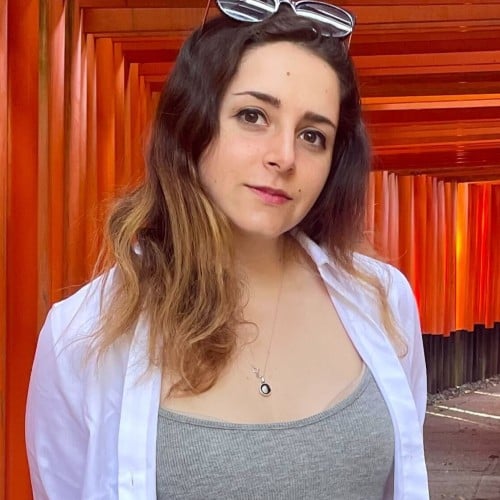
All the world’s a screen: young Hongkongers open up in a play about life-changing moments, social media’s impact
- Actors and directors from the Young Friends Special production, ‘All Things at Once’, share the experiences and themes that shaped this performance
- Every week, Talking Points gives you a worksheet to practise your reading comprehension with exercises about the story we’ve written
 In the play, Anabelle Li (left) re-enacts the moment when her close friend left for England. Photo: Instagram/hkafyfs
In the play, Anabelle Li (left) re-enacts the moment when her close friend left for England. Photo: Instagram/hkafyfsLights dimmed, bathing Shousan Theatre in darkness as an audience of 300 – many of whom were students in their uniforms – hushed in anticipation.
Those who bought tickets to see the Young Friends Special – part of the annual Hong Kong Arts Festival – were in for a twist on traditional theatre.
All Things at Once, the play performed last month, featured six young Hongkongers portraying a tight-knit group of friends. The performers held a mobile phone or tablet to film each other and themselves. Each video feed was projected onto the stage’s backdrop, giving the audience real-time perspectives from each actor.
They used their devices the way many people do in everyday life – applying filters and talking to the camera as they goofed around on stage or traversed heavier topics of conversation.
‘Grave step backwards’: Meta shuts monitoring tool in election year
“The work centres around how youth ... engage in understanding who they are through technology,” explained the play’s director Jackson Castiglione.
He crafted the script from the actors’ real tribulations as they teetered between adolescence and adulthood. After virtual meetings with the actors, Castiglione, who is from Australia, wrote a play that explores online dating, family dynamics, bullying, stereotypes and more – through the lens of social media.
“This work is about a younger generation reflecting themselves to other young people,” he added. “While it happens on social media every second of every day, I don’t think we’re necessarily conscious of it.”
Assistant director Eza Bakker-Graham, also from Australia, said: “Technology is meant to ... connect us all. And yet, at times, it can make us feel incredibly alone.”
A message that resonates
Castiglione’s project began during the Covid-19 pandemic when youngsters were forced to live their lives completely online – and their mental health was in decline. In a study released last year, researchers from the University of Hong Kong found that more than 16 per cent of young Hongkongers likely had at least one psychiatric disorder.
The topic of well-being is woven into each of the actors’ stories.
“It was a really magical feeling to share my own experience with the audience,” said 19-year-old Anabelle Li Sin-tung, who is an acting student at Baptist University. “I hope that some kind of message can resonate [with the audience].”
The story that Li shared with the audience was about a time when a close friend chose to move to London to pursue higher education.
Hong Kong authorities say no plan to ban social media platforms under Article 23
The audience watched as she discussed the move with her friends in the play – all while being filmed by the other actors. Several scenes later, she said goodbye to the actor playing her friend, who walked offstage.
With all of the cameras turned off, Li sat alone on the stage and cried, as the scene touched upon the challenges that social media often does not capture.
“I really enjoy showing my personal stories to the audience because I really hope ... it can have an effect on them,” she shared.
Li added that she was insecure at first with the prospect of strangers hearing this story, but she eventually came around to the idea and even told her friend about it.
She said: “When I told [the guy] who went to England that I used our stories as a script to show in the theatre, he was like, ‘Wow!’”
Playing with fire and technology
Fellow actress Yohanna Tam Yuk-ham, 23, re-enacted a near-death experience.
She lay flat on a bench with her arms resting on her stomach, depicting the time when she was in a coma struggling to survive after contracting Covid-19. The devices took the back seat in this sobering scene.
Tam told Young Post this was not her only near-death encounter: “Another time, I fell into the ocean from a cliff ... I was in a wheelchair for two weeks.”
“[Nearly] dying once made me feel [tough] ... but dying twice?” she said, noting how these experiences gave her a new perspective on life and made her less judgmental of others. “It feels like I do not have the right to comment on other people’s lives.”
Face Off: Should books, movies and TV shows come with content warnings?
Tam felt that this play was a unique representation of young people’s lives and interactions with social media.
She compared the impact of modern technology to humans’ discovery of fire. Fire kept people warm and cooked their food, but when it started to harm people, they were scared. But as humans grew smarter, they learned to control the fire, making them more powerful.
“Nowadays, we are kind of on the edge of an era ... AI is coming,” she noted. “Technology is too present in our lives – how are we going to solve this problem?”
She added that the source of modern problems “is actually from humans, not from technology”.
Ultimately, the actors hope that the play inspired people to rethink how social media alters their perceptions of reality.
Li pointed out: “We can’t control what happens in this world. But what we can control is how we think about ourselves or how we choose to live.”
To test your understanding of this story, download our printable worksheet or answer the questions in the quiz below.
